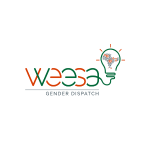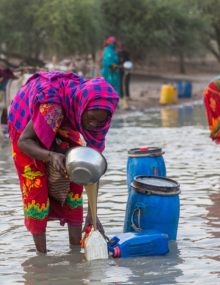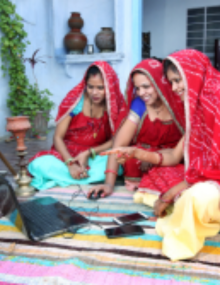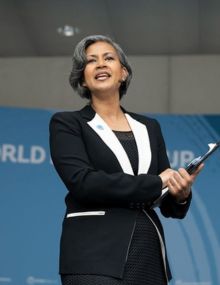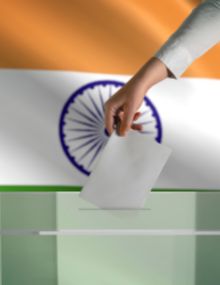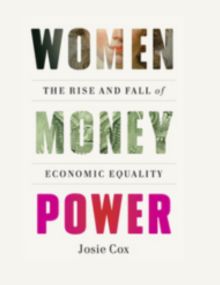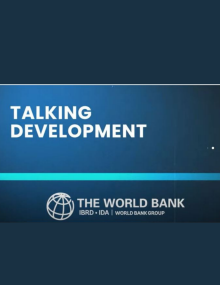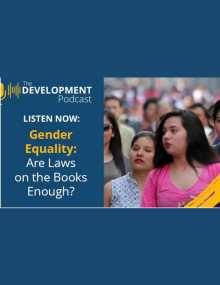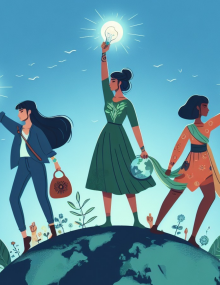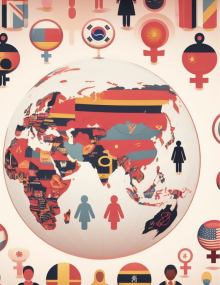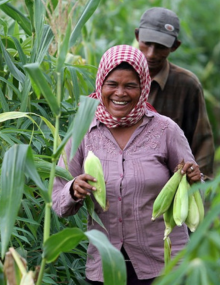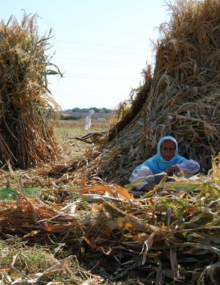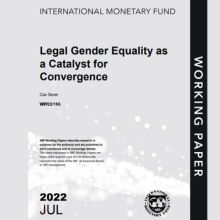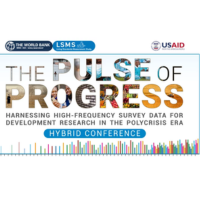
The Pulse of Progress: Harnessing High-Frequency Survey Data for Development Research in the Polycrisis Era (2024)
This treasure trove of papers and presentations from the World Bank’s Living Standards Measurement Study (LSMS) conference – The Pulse of Progress: Harnessing High-Frequency Survey Data for Development Research in the Polycrisis Era – offers new insights across six thematic areas, including firms, jobs, and gender.

More and better jobs: Unlocking the potential of South Asia’s women (2025)
This blog highlights how the World Bank and its partners are investing in programs across South Asia to expand women’s employment opportunities, including skills training in India, safer public transport in Bangladesh, and land rights reforms in Pakistan.The aim is to bring women into the workforce and empower them to seek better paying-jobs or start and grow their businesses. Despite advancements in education, health, and digital access, South Asia’s female labor force participation remains among the lowest globally at just 31%. This comes at a substantial economic cost. The recent South Asia Development Update estimates that gender parity in the workforce could boost per capita incomes by up to 50% – equal to nearly a $2 trillion rise in regional GDP.

Does Energy Poverty Matter for Gender Inequality? Global Evidence (2021)
This study analyzes data from 51 developing countries between 2002 and 2017 and finds that improved energy access boosts women's employment while also enhancing female health, education, and socio-economic rights. The findings emphasize that addressing energy poverty should be a key policy priority for governments aiming to reduce gender gaps.
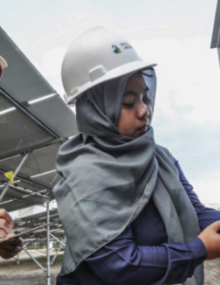
Enhancing Gender Equality in Infrastructure Development: Theories of Change, Indicators, and Sector Strategies (2023)
This report outlines the case for investing in gender equality and women’s empowerment in infrastructure projects and programs. It offers theories of change and indicators to enable gender-inclusive development in four infrastructure investment sectors – energy, transport, urban development, and water, sanitation and hygiene (WASH) – and identifies activities, components, and critical features for enhancing gender equality and women’s empowerment outcomes

World Migration Report (2024)
The latest World Migration Report presents key global and regional migration data and trends, relevant thematic issues, and an expanded range of digital tools. Chapter 6, “Gender and Migration: Trends, Gaps and Urgent Action,” examines how gender influences migration experiences throughout the migration cycle and emphasizes the need for gender-responsive migration governance.

The Impact of Financial Inclusion on Young Women’s Well-being: A Survey of Evidence and Recommendations for Practitioners (2023)
This working paper synthesizes recent evidence on financial inclusion interventions, concluding that access to financial services can help young women build financial assets and may facilitate other capabilities, such as human capital, economic participation, voice and agency, and bodily integrity – key factors for becoming healthy, productive, and empowered adults.

What Works in Supporting Women-Led Businesses? (2024)
Innovative women entrepreneurs can be agents of change, but they face multiple barriers to growing their businesses. This paper provides an updated review of what works to support growth-oriented women-led businesses, drawing on a substantial body of high-quality randomized controlled trials conducted with micro and small enterprises in low- or middle-income countries.

Gendered Impacts of Climate Change: Evidence from Weather Shocks (2023)
Focusing on the effects of weather shocks on endowments, economic opportunities, and agency, this report finds that the biggest gender-differentiated impacts are largely due to existing inequalities and restrictive social norms.
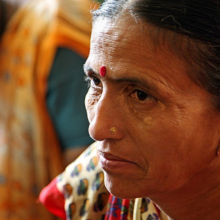
Strength in Numbers? Gender Composition, Leadership, and Women’s Influence in Teams (2023)
Are male-majority teams sexist? The field experiments conducted for this paper find that male-majority teams give women less influence and rarely choose them as external representatives. However, male behavior becomes significantly more egalitarian with changes in gender composition. Increasing the share of women on a team or assigning a female leader increases women’s influence even in male-majority teams – reducing the rate of discrimination against women by more than 50%.

Why Land and Property Rights Matter for Gender Equality (2023)
This evidence and practice note, from a series of policy notes written as part of the analytical foundation for the World Bank Group’s new Gender Strategy (2024-2030), investigates women’s rights, access to, and control over housing, land, and property. It provides emerging evidence on what works to help secure women’s tenure, including legal, regulatory, policy, and institutional reforms, clarification and formalization of women’s land rights, and how to improve research and data collection.

Placing Gender Equality at the Center of Climate Action (2023)
Focusing on the intersection of gender equality and climate change, this World Bank Gender Group policy note stresses the importance of empowering women and their leadership in climate action and addressing systemic disadvantages in access to jobs, income, resources, finance, and information. The note also explores how transitioning to low-carbon economies can create new opportunities for women and concludes with recommendations for development practitioners, policymakers, investors, and businesses.

Engaging Men for Women’s Economic Empowerment: Overview of the Evidence (2023)
Just how effective are programs that engage men to promote WEE? This brief by the World Bank’s Africa Gender Innovation Lab draws on findings from experimental and quasi-experimental studies to measure causal impact. The authors identify knowledge gaps, outline new lines of inquiry, and conclude that the evidence for engaging men shows mixed results – only half of programs led to improvements in women’s economic outcomes or household dynamics, with some documenting negative impacts on women’s agency.

Changing Rural Women’s Lives Through Gender Transformative Social Protection (2023)
Placing heavy emphasis on social norms, this report from the Food and Agriculture Organization of the United Nations calls for the use of gender transformative approaches to improve women's access to and uptake of social protection programs. It provides a review of programs, policies, and evidence of change – noting that even relatively small design tweaks and complementary measures make can make a difference.
Using Digital Solutions to Address Barriers to Female Entrepreneurship: A Toolkit (2021)
South Asia is undergoing rapid and steady growth in digitization and e-commerce, providing an important avenue for female entrepreneurs that can offer a more level playing field than the traditional marketplace. This comprehensive website from the World Bank offers a compendium of toolkits, guides, case studies, and numerous other resources for policymakers and practitioners designing interventions to further female entrepreneurship.

Engendering Access to STEM Education and Careers in South Asia (2023)
A “leaky pipeline” in upper secondary school means girls are underrepresented in science and mathematics tracks in higher education and technical training, reducing their access to and interest in STEM careers. This handy report provides a menu of potential interventions to fix the leaky pipeline.
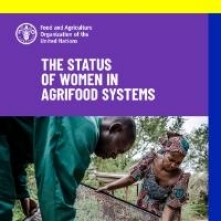
The Status of Women in Agrifood Systems (2023)
Transforming agricultural systems to improve productivity, closing gender gaps in access to assets and resources, and changing discriminatory social norms remain critical for achieving gender equality and women’s empowerment in South Asia. This comprehensive global report from the United Nation’s Food and Agriculture Organization is replete with data on constraints faced by women in the sector and promising interventions and policy changes that have yielded positive results.
Women and Online Learning in Emerging Markets (2022)
This fascinating study from the IFC, developed in partnership with Coursera and the European Commission, gives a comprehensive view of trends in Educational Technology (EdTech) – which is projected to grow to USD404 billion by 2025. EdTech is particularly salient in South Asia where conservative attitudes and concerns about mobility, safety, and family considerations impact women’s learning choices. This report is a must-read for a better understanding of the far-reaching potential of online learning in emerging economies and the importance of reaching out to women learners to achieve gender parity.
What do We Know About Interventions to Increase Women’s Economic Participation and Empowerment in South Asia? Care Polices and Care Services (2023)
Fifth in the series of systematic reviews carried out by the South Asia Gender Innovation Lab, this brief reviewed thousands of potential studies on the impact of childcare interventions on selected WEE outcomes and found five that met rigorous impact evaluation criteria. These studies provide important insights. First, in the presence of other constraints, the impact of childcare on WEE may be muted. Second, aggregate effects hide heterogeneity based on socio-economic status, norms, and household structure. The third insight, applicable to broader analysis of childcare, is that the quality of care is often insufficiently regulated and understudied.
The United States National Plan to End Gender-based Violence: Strategies for Action (2023)
The United States government this month announced its first plan to end gender-based violence. Pillar 3 of the comprehensive strategy includes goals to prevent GBV and provide economic security and long-term housing to survivors.
Legal Gender Equality as a Catalyst for Convergence (2022)
Convergence refers to when poorer economies catch up to richer economies in income. This research looks at a global sample of laws over five decades and finds that gains from gender-equal laws “facilitate income convergence over time” by promoting women's economic inclusion.
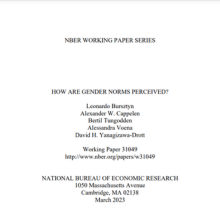
How Are Gender Norms Perceived? (2023)
Even in the age of social media saturated with updates and general airing of opinions, could it be possible that people misperceive something as fundamental as a woman’s right to work? A new (and major) study finds widespread support for women’s right to paid work all over the world, among both men and women. Everyone underestimates the level of support -- and this lowballing is particularly stark when it comes to estimating men’s support. The researchers of this groundbreaking work suggest a simple policy choice applicable for rich and poor countries alike: clearing misperceptions to foster greater gender equality.

